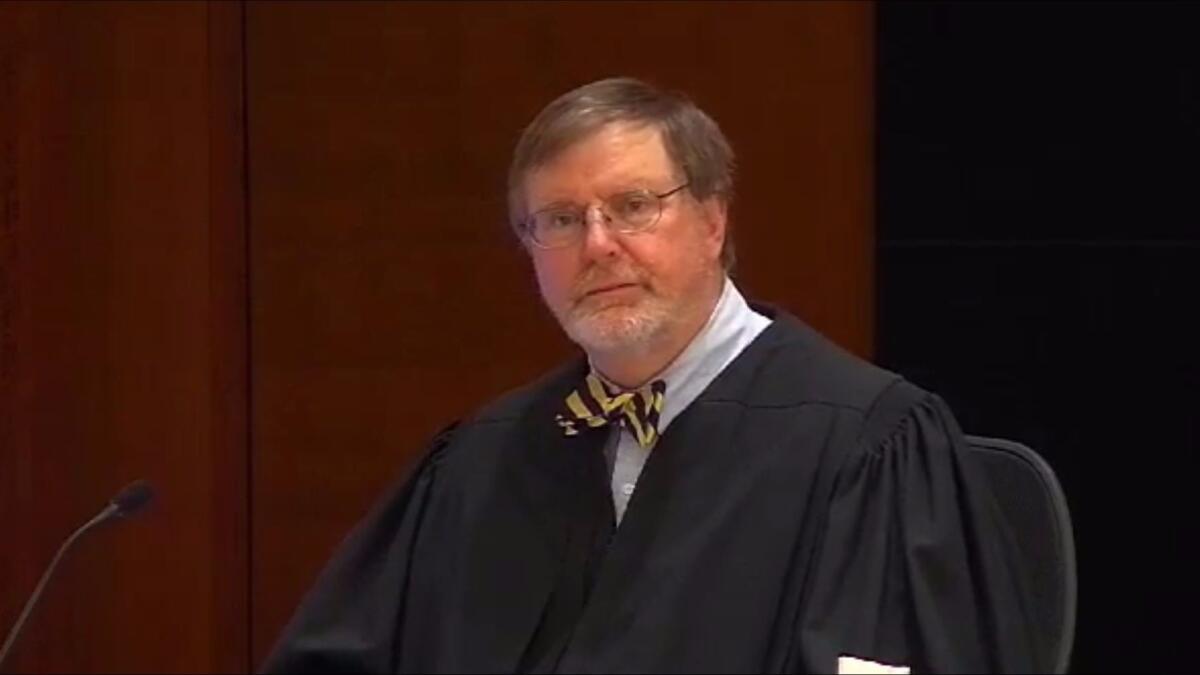U.S. 9th Circuit Court of Appeals is expected to decide quickly on Trump’s travel ban

Opponents of President Trump’s executive order on refugees and immigration began rallying in front of Tom Bradley International Terminal around 11 a.m. They were joined about an hour later by a smaller group of travel ban supporters who stationed th
- Share via
A federal appeals court has indicated it will move swiftly to decide whether to keep in place a nationwide hold on President Trump’s moratorium on travel from seven predominantly Muslim countries.
A three-judge panel of the U.S. 9th Circuit Court of Appeals declined early Sunday to immediately block an order from a federal judge in Washington that halted the travel ban.
Instead, the panel established a rapid schedule for written arguments.
A brief from the two states that challenged the ban was filed early Monday. The administration’s response was due at 3 p.m. Pacific time. A panel ruling could come anytime after that — most likely within a week, experts said.
In the meantime, the judges probably are already doing legal research on the issues.
The three judges who happen to be sitting on the 9th Circuit’s motions panel this month and who will rule on the case are William Canby Jr., a President Carter appointee; Richard Clifton, appointed by President George W. Bush; and Michelle T. Friedland, appointed by President Obama.
Clifton is considered moderately conservative and the two Democrats are viewed as moderately liberal. The 9th Circuit is broadly viewed as the most liberal federal appeals court.
The panel’s decision will not determine whether Trump’s order is constitutional. The court will decide whether an emergency hold should remain in force against the order until the constitutional issues are decided.
If the court decides to continue to block the ban, travelers who already have visas may continue to enter the U.S.
In issuing a temporary restraining order against Trump’s directive, the federal court in Washington state determined the states that challenged the ban would suffer immediate and irreparable harm in employment, business, education, familial relations and freedom to travel.
Some legal experts have described the dispute as uncharted, both in the legal sense and in the extraordinary scope of the travel ban.
If Trump loses, he could immediately go to the U.S. Supreme Court. Justice Anthony M. Kennedy, who handles matters from the 9th Circuit, would probably ask the other justices to weigh in.
The Supreme Court could issue a decision immediately, though it normally asks for written arguments. If the court were to tie 4-4 — the Senate has not yet confirmed Trump’s nominee to replace the late Justice Antonin Scalia — the 9th Circuit decision would prevail.
The case before the 9th Circuit stems from a challenge by the state of Washington, which Minnesota quickly joined. The states argued the ban would harm their economies and colleges.

U.S. District Judge James L. Robart, an appointee of President George W. Bush, ruled in favor of the states. He cited a 5th Circuit decision that blocked an Obama executive order on immigration.
The 5th Circuit decision against Obama’s directive, which would have protected certain immigrants from deportation, became law when the Supreme Court tied 4-4 after reviewing it.
The Trump administration appealed Robart’s decision to the 9th Circuit, which decides legal matters for nine Western states.
In his order, Robart emphasized that the United States has three equal branches of government.
“The work of the Judiciary, and this court, is limited to ensuring that the actions taken by the other two branches comport with our country’s laws, and more importantly, our Constitution,” Robart wrote.
Erwin Chemerinsky, dean of the UC Irvine School of Law, suggested Sunday that the 9th Circuit was likely to rule against the Trump administration.
“Virtually every judge to consider the executive order has said that there is a substantial likelihood that it is unconstitutional,” Chemerinsky said in an email. “Both Republican and Democratic appointees have come to this conclusion. Having read some of the briefs in these cases, I think any court is likely to come to this conclusion.”
Chemerinsky said predicting what the Supreme Court justices will do amounts to guesswork.
“My instinct is that they are unlikely to get involved at this early stage, especially with virtually all the lower courts coming out the same way,” he said.
Trump has prevailed in at least one case, though, when a federal judge in Boston refused to extend an order prohibiting officials from detaining or deporting people with valid visas or green cards.
The suit had been filed on behalf of two University of Massachusetts professors from Iran, who subsequently were admitted to the U.S.
The decision by Judge Nathaniel M. Gorton, who was appointed by President George H.W. Bush, said the American Civil Liberties Union had failed to show that the initial restraining order was needed after the Trump administration revised the ban.
Twitter: @mauradolan
ALSO
Legal battle over travel ban looms as Trump continues attacks on judge
How Trump’s policies and rhetoric are forging alliances between U.S. Jews and Muslims
In North Dakota, it could become legal to hit a protester with your car
UPDATES:
Feb. 6, 9:02 a.m.: This article has been updated to reflect that the brief from the states was filed.
This article was originally published at 6:15 p.m. Feb. 5.
More to Read
Sign up for Essential California
The most important California stories and recommendations in your inbox every morning.
You may occasionally receive promotional content from the Los Angeles Times.











